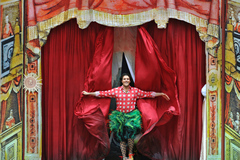| Opera Reviews | 25 April 2024 |
An event of historical significanceby Moore Parker |
|
| Von Winter: Das Labyrinth Salzburg Festival 14 August 2012 |
|
|
Schikaneder's choice for the composition, Peter von Winter may have failed to retain ongoing popularity since his demise in 1812, but in his day enjoyed considerable regard not just as a composer but as an acclaimed violinist, and conductor of the Mannheim Court Orchestra - an ensemble famed across the Continent for its high standards. While lacking the inspiration of the "Immortals" among composers, von Winter evidently was a competent technician and for DAs Labyrinth produced an easily accessible score which cleverly echoes Mozart's masterpiece, while maintaining a decent stamp of originality. The familiar characters in the plot all feature - together with a couple of minor additions and the impressive employment of a double Chorus, and the introduction of an extended Papageno family, with its (here charmingly performed) offspring of different ages. Sarastro remains largely within the format Mozart created - essentially lyrical throughout with occasional stretches into the cavernous regions of the bass range. Christof Fischesser creates a noble - if not grand - figure, excelling more in the upper ranges of his voice than in the depths. As Königen der Nacht, Julia Novikova tackles the character's fearless ambition with some aplomb, but not with undaunted vocal ease - and somewhat leaves the impression of a soprano singing on her capital rather than her interest. Her Drei Damen (Nina Bernsteiner, Christina Daletska, Monica Bohinec) also serve as Venus, Amor and as a Page. All were exemplary in accuracy and projection throughout, with their camp receiving strong support by two additions - Tipheus (Clemens Unterreiner) and Sithos (Philippe Sly). In Das Labyrinth Pamina takes on some of her mother's vocal character, with von Winter's portrayal adding dramatic coloratura moments to the accustomed lyricism. Malin Hartelius is more at ease in the latter, but despite some moments of vocal stress manages to create an appealing character with her attractive vocal timbre and sympathetic stage presence. Her Tamino, Michael Schade, brings his accustomed energy and verve to the performance in addition to his infallible vocal security. The young baritone, Thomas Tatzl is a charming Papageno who takes good advantage of the role's potential. Less prominent - but no less effective - his Papagena, delightfully taken here by Regula Mühlemann. Ute Gfrerer and Anton Scharinger as Papagena and Papageno senior, delightfully compliment the younger couple - carefully herding their numerous offspring and guaranteeing a refreshing contrast to the darker figures in the plot. Klaus Kuttler's Monostatos (here a baritone) is superb in every respect - definitely a name to watch. The generous and imposing choral scenes are strongly taken by the Salzburger Bachchor and Salzburger Festspiele und Theater Kinderchor with immaculate renderings by three of their (alas unnamed) junior members as the Drei Genien. Ivor Bolton maintains total harmony between pit and stage, drawing much fine playing from the Mozarteum Orchestra. In its initial Vienna and Berlin productions, Das Labyrinth enjoyed a prime staging - and unquestionably Schikander would have delighted at this production's inventive and charming setting in the courtyard of Salzburg's Residenzhof. Raimund Orfeo Voigt's sets and props allow the protagonists intimate contact with the audience while supporting the action with a virtual circus of effects which include flashing lights, helium-filled balloons, and an illuminated new moon upon which Pamina is abducted. Stunning costumes by Susanne Bisovsky and Elisabeth Binder-Neururer, and well-executed direction by Alexandra Liedtke strongly contribute to making this Festival event one of historic significance, with an appeal to all generations. |
|
| Text ©
Moore Parker Photo © Hans Jörg Michel |

 DAs
Labyrinth - or Der Zauberflöte zweyther Theil - is true
testament to Emmanuel Schikaneder's canny ability - not just to milk
a theme for all its' value - but to underscore his own personal success
and popularity with audiences of the day by augmenting his much-loved
Papageno figure into a "senior" and a "junior", while presenting the
latter protagonist's potential to become the "show stealer" in this
sequel to Mozart's final work for the stage.
DAs
Labyrinth - or Der Zauberflöte zweyther Theil - is true
testament to Emmanuel Schikaneder's canny ability - not just to milk
a theme for all its' value - but to underscore his own personal success
and popularity with audiences of the day by augmenting his much-loved
Papageno figure into a "senior" and a "junior", while presenting the
latter protagonist's potential to become the "show stealer" in this
sequel to Mozart's final work for the stage. 





